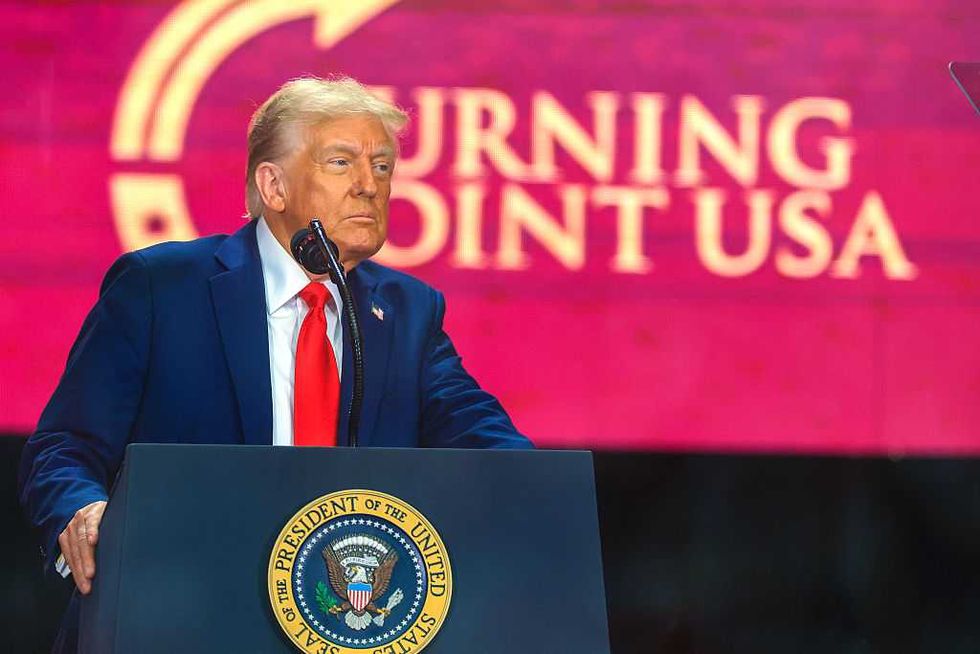President Donald Trump is no stranger to dropping jaws and turning heads with his rhetoric, bombastic commentary, and sometimes shocking statements.
While these reactions are typically sparked by the comical names he concocts for his opponents, his hot political takes, and other bold moves, the commander in chief has recently made headlines for some of his more theological proclamations and curiosities.
‘I’m not sure I can make it, but he’s going to make it. He’s there. He’s looking down on us right now.’
Trump was aboard Air Force One when he told reporters last Sunday that he’s unsure if he’ll make it to heaven. He prefaced his words by noting he was being “a little cute,” but proceeded to drop some thoughts about the afterlife.
“I don’t think there’s anything going to get me in heaven,” he said. “I think I’m not maybe heaven-bound. … I’m not sure I’m going to be able to make heaven.”
Just a few days later, while giving the late Charlie Kirk a posthumous Presidential Medal of Freedom, the highest civilian honor, Trump again brought up heaven.
“In his final moments, Charlie testified to the greatness of America and to the glory of our Savior, with whom he now rests in heaven,” he said. “And he is going to make heaven. I said I’m not sure I can make it, but he’s going to make it. He’s there. He’s looking down on us right now.”
There have been other similar instances. Trump once pondered whether ending the Ukraine war would help secure his eternal glory. And at Charlie Kirk’s memorial service last month, the president made another headline-grabbing comment. Heralding Kirk’s love for his enemies, Trump painted a disparity between himself and the late Turning Point USA founder.
“[Charlie] did not hate his opponents. He wanted the best for them,” Trump said. “That’s where I disagreed with Charlie. I hate my opponent and I don’t want the best for them. I’m sorry.”
Responses to these proclamations have been swift and harsh. They have also rightly raised some questions about “earning” eternal salvation and the biblical command to love enemies. While some of those questions are fair, much is being missed in the mix of commentary and conjecture about Trump’s theology.
RELATED: Christian call to action: Pray for President Trump
 Joe Raedle/Getty Images
Joe Raedle/Getty Images
First, it’s often tough to discern when Trump is being facetious or comical, making it almost impossible to know his real intent behind these remarks. Beyond that, the critics lambasting Trump should consider a different approach: prayer.
Anyone can be an armchair critic, but if Trump vociferously continues to bring up heaven, eternal salvation, and other related theological topics, there’s a solid chance it’s something he’s been contemplating personally. This seems incredibly likely in the wake of the attempts against his own life and after Kirk — a staunch friend and ally — was killed so publicly.
Some people seem to have missed the glaring reality that now is the time to move ceaseless critique to the side and double down on prayer for Trump to discern, comprehend, and embrace the fullness of the gospel of Jesus Christ.
But there’s another element being missed amid the mix of reactions.
Some people claim that Trump needs better faith advisers, deriding the Christians who have coalesced around him. The assumption is that these leaders aren’t sharing biblical truth with the president.
But I know for a fact that Trump has heard the gospel. The late Phil Robertson of “Duck Dynasty” fame once personally told me how he shared Jesus’ life, death, and resurrection directly with Trump leading up to the 2016 election.
“[I discussed] God becoming flesh … dying for the sins of the world, and, in his case, I said, ‘Dying for your sins, Donald, all of them, I figure there’s a lot — what do you think?’” Robertson told me. “He didn’t disagree with me.”
Robertson also drew an image of “an arrow coming down out of heaven … God becoming flesh, a cross, where Jesus took away the sins of the world.”
The point is: Trump has heard the gospel, and rather than trashing him, we should be doubling down in prayer that he comes to a place of full repentance and understanding.
Still, we must consider the deeper theological issues at the center of Trump’s remarks.
In the New Testament, James makes it clear that “faith without works is dead.” Interestingly, Trump has been talking a lot about peace deals and good deeds, pondering whether those acts can get him to heaven. The Bible has much to say about this topic.
“What good is it, my brothers, if someone says he has faith but does not have works? Can that faith save him?” James 2:14 reads, with verses 15-17 continuing: “If a brother or sister is poorly clothed and lacking in daily food, and one of you says to them, ‘Go in peace, be warmed and filled,’ without giving them the things needed for the body, what good is that? So also faith by itself, if it does not have works, is dead.”
James’ words are important not because works save us, but because the Holy Spirit, which dwells in us when we accept Christ and live a life for him, sparks in us a quest to live out Jesus’ call to love God and love others.
Simply stated: We do good because we’re guided by the Lord and His heart for others.
This message is boiled down beautifully by Christ himself in John 3. In that chapter, Jesus tells Nicodemus, a religious leader, that “you must be born again” to enter heaven. Nicodemus seems confused, pondering how one could re-enter his mother’s womb after birth.
That’s when Jesus explains that the rebirth in question is a spiritual one — a death to self and a life for the Lord. John 3:16, arguably the Bible’s most famous verse, tackles God sending his son to die for mankind so that people can have eternal life.
But what comes next is often overlooked.
“For God did not send his Son into the world to condemn the world, but in order that the world might be saved through him,” John 3:17 reads, with verse 18 continuing: “Whoever believes in him is not condemned, but whoever does not believe is condemned already, because he has not believed in the name of the only Son of God.”
Ultimately, one must die to self and live for Christ. There’s no action — without this move — that affords anyone eternal life. Trump might be the most powerful person in the world, but he, like all of us, must decide whether he will embrace this reality.
Rather than endlessly lambasting him over his attempts to understand, we should devote ourselves to praying for him while also pondering whether we, too, have fully embraced this truth.
The post Trump’s heaven question shocks critics — but they missed the real story appeared first on TheBlaze.




